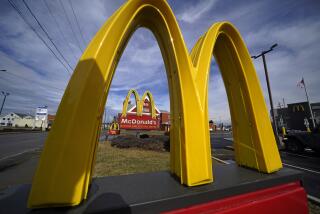Jack in the Box Slashes Forecast on Weak Sales
- Share via
NEW YORK — Jack in the Box Inc. on Tuesday halved its quarterly earnings forecast, citing soft sales as well as charges to close several of its fast-food restaurants and to settle a lawsuit filed by California employees.
Shares of the San Diego company fell more than 9%, or $2.55, to $24.65, on the New York Stock Exchange, where they were among the worst percentage losers.
Jack in the Box, whose restaurants are mainly in the West and Southwest, said sales at restaurants open at least a year, a key industry measure, will show a 3% drop for the fourth quarter ending Sept. 29.
It expects to report a profit of 34 cents a share, down from its July 31 forecast of 67 cents and from year-earlier earnings of 52 cents.
Chief Executive Robert Nugent said sales were softer than anticipated because of the weak economy and because the “Our Best Burgers Ever” marketing campaign failed to ramp up sales as quickly as expected.
Unveiled July 31, the campaign featured new ingredients, additional menu items such as Mexican taquitos and revamped food packaging in an effort to distinguish the chain in the increasingly cutthroat fast-food market.
Salomon Smith Barney analyst Mark Kalinowski downgraded Jack in the Box stock from “outperform” to “in-line,” saying the same-store sales figures are weaker than he had expected. Kalinowski cut his share-price target to $25 from $36.
Jack in the Box said it will cost about $9.5 million, including legal fees, to settle the 2001 suit in which employees in California alleged that the company did not properly pay overtime.
Closing of the eight restaurants will cost $6.1 million, Jack in the Box said, adding that it expects the move to benefit operating earnings in the next fiscal year and beyond.
Excluding the two charges, the company said it expects to report fourth-quarter earnings of 60 cents, below the average estimate of 67 cents from analysts surveyed by research firm Thomson First Call.
Jack in the Box said it has agreed to repurchase interests in 76 restaurant properties that have been encumbered by a 1994 lease transaction.
In January, it plans to pay off the $70 million of notes used to finance the leases.
More to Read
Inside the business of entertainment
The Wide Shot brings you news, analysis and insights on everything from streaming wars to production — and what it all means for the future.
You may occasionally receive promotional content from the Los Angeles Times.










